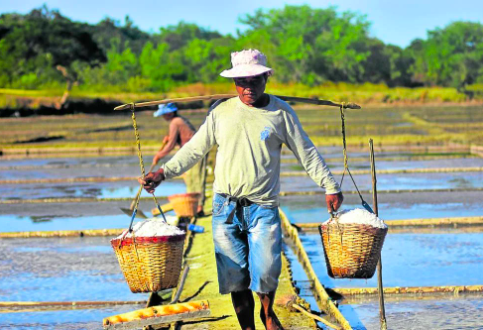Salt industry revival plan to start with ‘profiling’ – DA

SHRINKING SPACE: Among the first steps being taken by the Department of Agriculture to save the local salt industry is identifying the areas where it still manages to survive despite the measly income generated for the community, like here in Barangay Telbang, Alaminos City, in Pangasinan. —WILLIE LOMIBAO
MANILA, Philippines — After many years of neglect, the country’s salt industry is finally getting much-needed attention through a P100-million revitalization program to be implemented by the Department of Agriculture (DA).
The DA issued on Wednesday the implementing guidelines of the Development of Salt Industry Project (DSIP), which will be carried out until the end of this year and zero in on bolstering local production by using the latest technologies to ensure ample domestic supply.
“Salt has been a very important commodity for thousands of years, and has engraved its part in the economic history of the world. The country needs to increase salt production because salt is a food security issue,” the project document said.
“Not being able to produce its own local salt will hurt the country’s competitiveness and ability to become a successful agro-industrial economy. It is clear that to increase local salt production means to increase the salt producing areas,” it added.
The country has 36,000 kilometers of shoreline, yet it buys 93 percent of its salt requirements from abroad.
Agriculture Undersecretary Domingo Panganiban had noted that the Philippines was not capable of meeting its own salt needs due to the lack of government support.
Industry profile
Before putting the plan into action, the DA will try to get a clearer picture of the state of the local salt industry, or whatever is left of it.
It will begin by profiling, assessing, and shortlisting the existing salt production areas in Ilocos Region, Western Visayas and Zamboanga Peninsula.
The National Fisheries Research and Development Institute (NFRDI), in coordination with the Bureau of Fisheries and Aquatic Resources’ (BFAR) regional field offices and local government units (LGUs), will then identify and select project sites in the following regions: Ilocos Region, Central Luzon, Calabarzon (Cavite, Laguna, Batangas, Rizal and Quezon), Western and Central Visayas, Zamboanga Peninsula and Northern Mindanao.
The goal is for the DA to come up with a comprehensive profile of salt farmers, producers, traders, distributors, importers and consumers nationwide, and identify areas where efficient salt production can be located.
The project will target existing salt farmers and producers, fisherfolk groups seeking to collaborate and adopt the latest technologies to improve the production process, as well as salt producers wanting to revive their operation.
Training
The DA will likewise open the DSIP to salt producers who are willing to undergo training on appropriate technologies for product formulation, packaging and labeling.
They must be registered under the fisherfolk registry system of the LGU or the Registry System for Basic Sectors in Agriculture.
Concerned LGUs, in consultation with the Fisheries and Aquatic Resources Management Council, will then endorse the potential beneficiaries.
Both the BFAR and the NFRDI will select the beneficiaries, who will be given access to the market through linkages with potential buyers (through market matching) and external funding, including grants, credits and investments.
Clustering and consolidating the production, processing and marketing activities of salt farmer-beneficiaries will be conducted to maximize the interventions and assistance to be given by the DA under the program.
“Individual salt farmers in a community will be formed into a cooperative to avail of opportunities from CDA (Cooperative Development Authority) and other funding agencies,” the project guidelines said.
This strategy of consolidation aims to escalate local salt production, facilitate transactions with government financing institutions, increase access to government support programs, and acquire close linkages to suppliers, consumers and marketing services.
It will also improve production and manufacturing lines that cannot be undertaken by individual units, especially for small-scale subsistence producers.
Technology support
The project will also rely on research and capacity building to enhance salt production, processing and packaging technologies.
To do so, the NFRDI will concentrate on boosting and sustaining local salt production by providing the necessary production, postharvest and marketing-related assistance to the selected salt farmers and project beneficiaries.
These involve the development and standardization of processing methods, consumers’ acceptability tests, and market research for locally produced sea salt products, as well as revisiting and amending existing policies governing the salt industry.
To ensure food safety and product standards, capability-building activities, along with production materials, equipment and facilities, will be provided to improve the handling, processing, storage and distribution of salt products.
The project will also cover the improvement of the existing holding or storage facility to keep salt products in a hygienic manner. This way, packed salt products stored in a sanitary and enclosed room will be free from contaminants.
RELATED STORIES:
Gov’t working ‘double time’ to boost salt industry
‘Shameful’ for archipelagic PH to import salt, says Villanueva
Disclaimer: The comments uploaded on this site do not necessarily represent or reflect the views of management and owner of Cebudailynews. We reserve the right to exclude comments that we deem to be inconsistent with our editorial standards.
